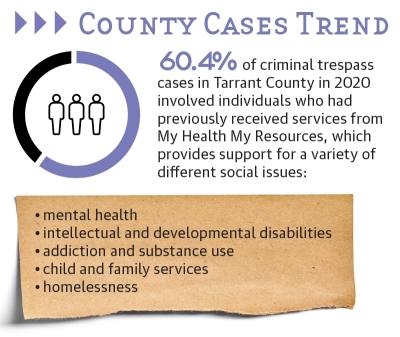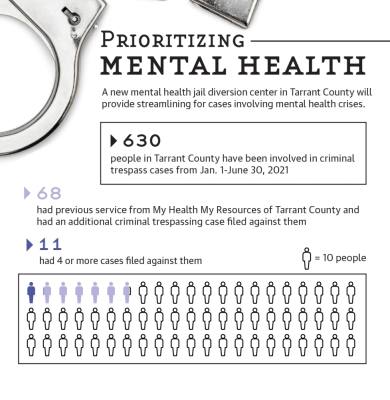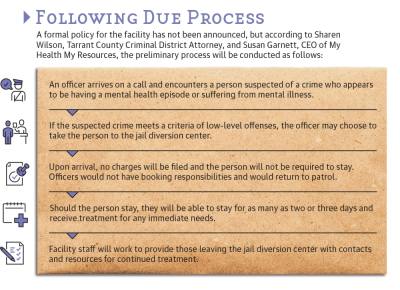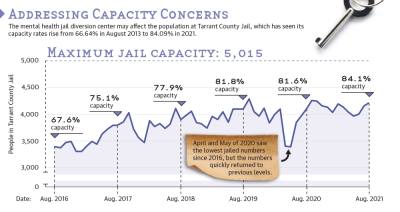The facility would serve as an alternative for local law enforcement officers who encounter people suffering from mental illness or a mental health episode. Oftentimes, officers end up charging such people with low-level offenses. Police departments for Grapevine, Colleyville and Southlake would be among the 48 law enforcement agencies in Tarrant County eligible to use the facility.
On July 27, the Tarrant County Commissioners Court gave county staff approval to identify and purchase a building in which the facility would be located. Officials said that purchase is in the process of being completed, at which time the location of the building can be announced. The Court also determined that My Health My Resources of Tarrant County would operate the facility on the county’s behalf.
County Administrator G.K. Maenius said that the target for the facility to be operational is by the end of the calendar year. He also said that the county would use funds provided by the American Rescue Plan to purchase the building and operate the facility for its first two years. That funding assurance would provide an important runway for staff there to get rolling, officials said.
The need for more options for calls involving mental health issues is something that Southlake Police Chief James Brandon said is important.
“[Police] are the default people to call, [and] our options are kind of limited with people that are in that situation,” Brandon said. “Arresting them for [a low-level offense] enters them into the criminal justice system, which really does nothing to alleviate the problem that is at its core.”
The mental health jail diversion center aims to create another option for law enforcement.
Data driven
Throughout 2020 and into this year, Tarrant County Criminal District Attorney Sharen Wilson had her office coordinate with MHMR, which provides mental health services for residents as well as Tarrant County Jail inmates. Each month, Wilson’s staff would send a list of offenders charged with criminal trespassing—one of the common low-level offenses that the jail diversion center would service.
The staff at MHMR would then track how many of those arrested had previously received mental health services from their team.
The idea was to see if there was an issue with recidivism. In 2020, Wilson said, there were 1,713 criminal trespassing cases in Tarrant County. Of those cases, 1,035 of the offenders had previously received services from MHMR.
“It’s a shockingly high number,” Wilson said. “I was surprised—and I’m never surprised.”
The numbers of inmates at Tarrant County Jail receiving mental health services is also significant. Susan Garnett, chief executive officer for MHMR, notes that during the past three fiscal years, dating back to 2018-19, MHMR has provided services to 21,432 individuals at the jail.
“Our jail has a really significant health and mental health component to it,” Garnett said. “But jail, by its very nature, is not the right humane environment for people with mental health conditions.”
According to Garnett and Wilson, officers who encounter a suspect for certain low-level offenses would have the discretion to divert them to the mental health jail diversion center. No criminal charges would be filed.
Those taken to the center would be able to stay for as long as two or three days, Garnett said. They could also leave at any time, she said.
Once those staying have had their short-term needs attended to, staff will present them with resources and connect them with further help for when they depart.
County Commissioner Gary Fickes, whose Precinct 3 includes northeast Tarrant County, said one goal is to break the cycle of repeat offenders.
“Our hope is that when we do release them, they’re released into a better environment than they were in,” Fickes said. “We can provide them help and stop that chain. ... It’s just a vicious cycle.”
A range of benefits
The program has additional benefits, Wilson said. For instance, the expectation is that, as opposed to a booking process that can take several hours, officers will be in-and-out of the jail diversion center in well under one hour and back on patrol.
“Anything that can allow us to get that officer back into service is a very good thing,” Wilson said.
There are also potential cost-savings associated with avoiding the booking, housing and defense elements of the criminal justice system.
Amanda McNew, media manager for the Grapevine Police Department, said once the center is open, GPD will train its officers on how and when they can use it.
Brandon also expressed support for using the mental health jail diversion center.
“[In] our police department, multiple times per day ... we encounter people that are having some kind of mental issue,” Brandon said.
In Colleyville, Dara Nelson—the services sergeant responsible for mental health case follow-ups—said Colleyville police encounter fewer cases, but nevertheless the department takes the matter of mental health to heart.
“We do take it very seriously,” Nelson said.
Garnett said that the change in recent years in public perception and leadership toward mental health has been important in reorienting the discussion.
“What we’ve seen is a sea change in our leaders who say, ‘Well, maybe there is a better way,’” Garnett said.
And as the center becomes closer to being a reality, the enthusiasm for it by advocates remains high.
“It is a win for everybody,” Wilson said. “And you can’t always say that about criminal justice changes.”









